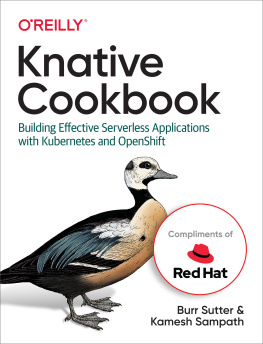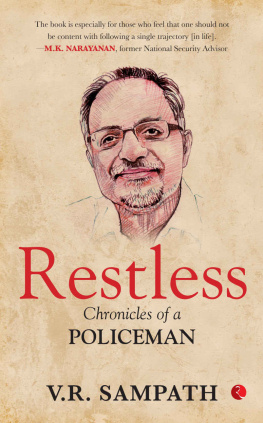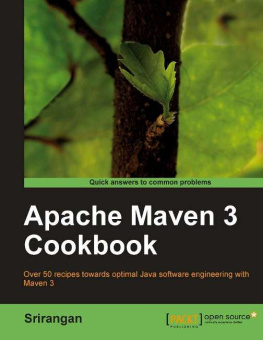Kamesh Sampath - Knative Cookbook - Red Hat version
Here you can read online Kamesh Sampath - Knative Cookbook - Red Hat version full text of the book (entire story) in english for free. Download pdf and epub, get meaning, cover and reviews about this ebook. year: 2020, publisher: OReilly Media, Inc., genre: Computer. Description of the work, (preface) as well as reviews are available. Best literature library LitArk.com created for fans of good reading and offers a wide selection of genres:
Romance novel
Science fiction
Adventure
Detective
Science
History
Home and family
Prose
Art
Politics
Computer
Non-fiction
Religion
Business
Children
Humor
Choose a favorite category and find really read worthwhile books. Enjoy immersion in the world of imagination, feel the emotions of the characters or learn something new for yourself, make an fascinating discovery.
- Book:Knative Cookbook - Red Hat version
- Author:
- Publisher:OReilly Media, Inc.
- Genre:
- Year:2020
- Rating:5 / 5
- Favourites:Add to favourites
- Your mark:
- 100
- 1
- 2
- 3
- 4
- 5
Knative Cookbook - Red Hat version: summary, description and annotation
We offer to read an annotation, description, summary or preface (depends on what the author of the book "Knative Cookbook - Red Hat version" wrote himself). If you haven't found the necessary information about the book — write in the comments, we will try to find it.
Knative Cookbook - Red Hat version — read online for free the complete book (whole text) full work
Below is the text of the book, divided by pages. System saving the place of the last page read, allows you to conveniently read the book "Knative Cookbook - Red Hat version" online for free, without having to search again every time where you left off. Put a bookmark, and you can go to the page where you finished reading at any time.
Font size:
Interval:
Bookmark:

by Burr Sutter and Kamesh Sampath
Copyright 2020 OReilly Media. All rights reserved.
Printed in the United States of America.
Published by OReilly Media, Inc. , 1005 Gravenstein Highway North, Sebastopol, CA 95472.
OReilly books may be purchased for educational, business, or sales promotional use. Online editions are also available for most titles (http://oreilly.com). For more information, contact our corporate/institutional sales department: 800-998-9938 or corporate@oreilly.com .
- Acquisitions Editor: John Devins
- Development Editor: Jeff Bleiel
- Production Editor: Christopher Faucher
- Copyeditor: Kim Cofer
- Proofreader: Tom Sullivan
- Indexer: Potomac Indexing, LLC
- Interior Designer: David Futato
- Cover Designer: Karen Montgomery
- Illustrator: Rebecca Demarest
- April 2020: First Edition
- 2020-04-01: First Release
See http://oreilly.com/catalog/errata.csp?isbn=9781492061199 for release details.
The OReilly logo is a registered trademark of OReilly Media, Inc. Knative Cookbook, the cover image, and related trade dress are trademarks of OReilly Media, Inc.
The views expressed in this work are those of the authors, and do not represent the publishers views. While the publisher and the authors have used good faith efforts to ensure that the information and instructions contained in this work are accurate, the publisher and the authors disclaim all responsibility for errors or omissions, including without limitation responsibility for damages resulting from the use of or reliance on this work. Use of the information and instructions contained in this work is at your own risk. If any code samples or other technology this work contains or describes is subject to open source licenses or the intellectual property rights of others, it is your responsibility to ensure that your use thereof complies with such licenses and/or rights.
This work is part of a collaboration between OReilly and Red Hat, Inc. See our statement of editorial independence.
978-1-492-06121-2
[LSI]
Serverless architecture has recently taken center stage in cloud native application deployment. Enterprises started to see the benefits that serverless applications bring to them, such as agility, rapid deployment, and resource cost optimization. As with any other new technology, there were multiple ways to approach and/or employ serverless technologies, such as Function as a Service (FaaS) and Backend as a Service (BaaS)that is, running your applications as ephemeral containerswith the ability to scale up and down.
Knative was started with the simple goal of having a Kubernetes-native platform to build, deploy, and manage your serverless workloads. Kubernetes solves a lot of cloud native application problems, but with a fair bit of complexity, especially from the perspective of deployment. To make a simple service deployment with Kubernetes, a developer has to write a minimum of two YAMLs, such as a Deployment service, and then perform the necessary plumbing work to expose the service to the outside world. The complexity makes an application developer spend more time crafting the YAMLs and other core platform tasks rather than focusing on the business need.
Knative tries to solve these Kubernetes problems by providing all essential middleware primitives via a simpler deployment model. On Knative you can deploy any modern application workload, such as monolithic applications, microservices, or even tiny functions. Knative can run in any cloud platform that runs Kubernetes, which gives enterprises more agility and flexibility in running their serverless workloads without relying on cloud vendorspecific features.
The fact there are many ways to do serverless has resulted in confusion among developers, with following questions being raised immediately:
What implementation should I choose: FaaS or BaaS?
What is the quickest way to get started?
What are the use cases for which I can apply serverless technology?
How do I measure the benefits?
What tools I should use to develop the serverless applications?
We had the same set of questions when we started to explore serverless technology. The problems and challenges that we faced during our research became the crux of this cookbook. This book serves as a practical guide in how to solve those challenges, with detailed examples.
It is called a cookbook because the examples are structured as recipes, each with a Problem, Solution, and a Discussion with possible detailed explanations. As it is impossible to cover all possible serverless methods listed earlier, we decided to choose BaaS. Knative is a Kubernetes-based platform that helps to run your serverless workload in the BaaS way.
This book is for for architects and developers who have a solid understanding of Kubernetes core concepts and who wish to enhance their knowledge in building real-world applications with Knative.
The following typographical conventions are used in this book:
ItalicIndicates new terms, URLs, email addresses, filenames, and file extensions.
Constant widthUsed for program listings, as well as within paragraphs to refer to program elements such as variable or function names, databases, data types, environment variables, statements, and keywords.
Constant width boldShows commands or other text that should be typed literally by the user.
Constant width italicShows text that should be replaced with user-supplied values or by values determined by context.
This element signifies a tip or suggestion.
This element signifies a general note.
This element indicates a warning or caution.
You can download this books source code from our GitHub Repo as a ZIP file or clone the repository locally using git, as shown here:
$BOOK_HOME is a variable that refers to the source code directory on your machine where you downloaded the recipe code examples.
If you have a technical question or a problem using the code examples, please send email to .
This book is here to help you get your job done. In general, if example code is offered with this book, you may use it in your programs and documentation. You do not need to contact us for permission unless youre reproducing a significant portion of the code. For example, writing a program that uses several chunks of code from this book does not require permission. Selling or distributing examples from OReilly books does require permission. Answering a question by citing this book and quoting example code does not require permission. Incorporating a significant amount of example code from this book into your products documentation does require permission .
We appreciate, but generally do not require, attribution. An attribution usually includes the title, author, publisher, and ISBN. For example: Knative Cookbook by Burr Sutter and Kamesh Sampath (OReilly). Copyright 2020 OReilly Media Inc., 978-1-492-06119-9.
Font size:
Interval:
Bookmark:
Similar books «Knative Cookbook - Red Hat version»
Look at similar books to Knative Cookbook - Red Hat version. We have selected literature similar in name and meaning in the hope of providing readers with more options to find new, interesting, not yet read works.
Discussion, reviews of the book Knative Cookbook - Red Hat version and just readers' own opinions. Leave your comments, write what you think about the work, its meaning or the main characters. Specify what exactly you liked and what you didn't like, and why you think so.







